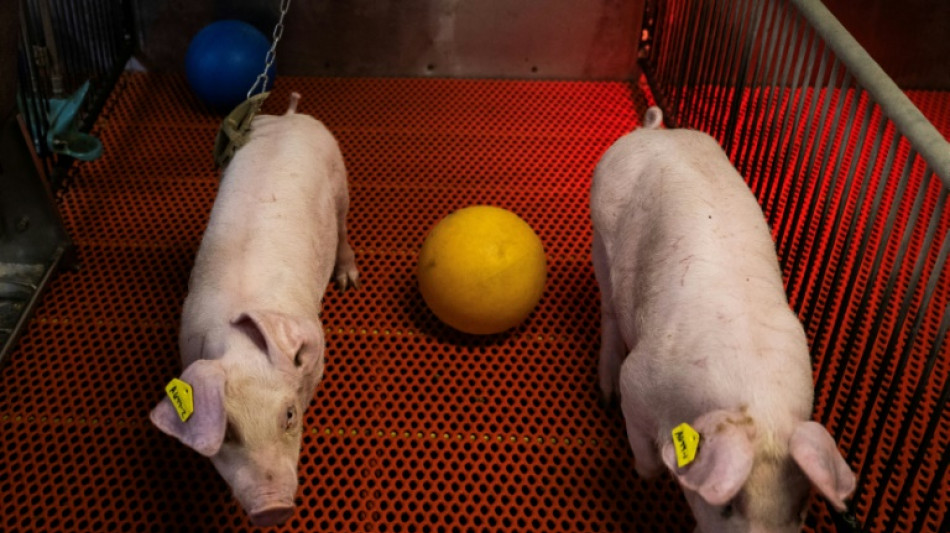
-
 Mexico probes public thanks to drug lord for children's gifts
Mexico probes public thanks to drug lord for children's gifts
-
Signs Christmas market attack suspect mentally ill: German minister

-
 Five years on, WHO urges China to share Covid origins data
Five years on, WHO urges China to share Covid origins data
-
Anger in Germany at Musk attempt to 'influence' election

-
 'Foreign jihadists' in Syria leader's pick for army officers: monitor, experts
'Foreign jihadists' in Syria leader's pick for army officers: monitor, experts
-
US announces $5.9 bn in military, budget aid for Ukraine

-
 Argentina charges five over death of singer Liam Payne
Argentina charges five over death of singer Liam Payne
-
Sporting deaths of the year -- Part II

-
 US prepares state honors for late president Jimmy Carter
US prepares state honors for late president Jimmy Carter
-
Shahidi, Bennett star as Afghanistan draw Zimbabwe Test

-
 LeBron James prepares to follow those who kept winning after 40
LeBron James prepares to follow those who kept winning after 40
-
Sporting deaths of the year -- Part I

-
 No Santa rally for stocks as equities slide
No Santa rally for stocks as equities slide
-
Serbian court jails parents of Belgrade school shooter

-
 For the first time, Syrians 'not afraid' to talk politics
For the first time, Syrians 'not afraid' to talk politics
-
In Iran, late Jimmy Carter remembered as 'architect of sanctions'

-
 AC Milan hire Conceicao after firing coach Fonseca
AC Milan hire Conceicao after firing coach Fonseca
-
German security chiefs face questions over Christmas market attack

-
 Former Serbian minister among 13 charged over fatal train station accident
Former Serbian minister among 13 charged over fatal train station accident
-
S.Africa coach Conrad unapologetic about 'easy' route to Test final

-
 Duffy, Hay heroics secure T20 series for New Zealand over Sri Lanka
Duffy, Hay heroics secure T20 series for New Zealand over Sri Lanka
-
Rohit concedes his form is 'disturbing' for beaten India

-
 Climate change brought extreme weather, heat in 2024: UN
Climate change brought extreme weather, heat in 2024: UN
-
Bestaven's Vendee Globe title defence ends in tears

-
 AC Milan sack coach Fonseca after just six months
AC Milan sack coach Fonseca after just six months
-
Defending champion Dimitrov eases into Brisbane second round

-
 Anguish for South Korea plane crash relatives amid grim salvage
Anguish for South Korea plane crash relatives amid grim salvage
-
Clinical Swiatek romps as Tsitsipas crashes at United Cup

-
 Hay cameo lifts New Zealand to 186-5 in 2nd Sri Lanka T20
Hay cameo lifts New Zealand to 186-5 in 2nd Sri Lanka T20
-
Australia win Test thriller to lead series after late India collapse

-
 Ex-husband convicted in French mass rape trial will not appeal: lawyer
Ex-husband convicted in French mass rape trial will not appeal: lawyer
-
French premier promises concrete aid for cyclone-hit Mayotte

-
 Belgium becomes first EU country to ban disposable e-cigarettes
Belgium becomes first EU country to ban disposable e-cigarettes
-
Tsitsipas upset as Kazakhstan beat Greece to make United Cup knockouts

-
 Australia rip out seven late wickets to beat India, lead series 2-1
Australia rip out seven late wickets to beat India, lead series 2-1
-
Osaka makes winning start to season in Auckland

-
 Rookie Daniels leads Commanders into NFL playoffs after dramatic win
Rookie Daniels leads Commanders into NFL playoffs after dramatic win
-
Gutsy Jaiswal fifty gives India hope of saving 4th Australia Test

-
 Asia stocks mostly down after Wall St losses
Asia stocks mostly down after Wall St losses
-
Flags fly at half-mast as S. Korea probes its worst plane crash

-
 Indian workers replace Palestinians in Israel's building sector
Indian workers replace Palestinians in Israel's building sector
-
S. Korea investigators seek arrest warrant for President Yoon over martial law

-
 German security chiefs to face questions over Christmas market attack
German security chiefs to face questions over Christmas market attack
-
A fearful New Year in temporary homes after Japan quake

-
 Record 350,700 spectators flock to Australia-India 4th Test
Record 350,700 spectators flock to Australia-India 4th Test
-
Haliburton shines as Pacers avenge blowout loss to Celtics

-
 Rohit, Kohli fall as India 33-3 chasing 340 against Australia
Rohit, Kohli fall as India 33-3 chasing 340 against Australia
-
Key moments in the life of Jimmy Carter

-
 NBA fines Timberwolves' Edwards for profanity
NBA fines Timberwolves' Edwards for profanity
-
NBA's 'King' James on top of his game at 40

| CMSC | -0.09% | 23.44 | $ | |
| RIO | -0.57% | 58.675 | $ | |
| SCS | -1.63% | 11.68 | $ | |
| CMSD | -0.09% | 23.3 | $ | |
| BTI | -0.85% | 36.005 | $ | |
| BCE | -0.58% | 22.53 | $ | |
| BP | 0.63% | 29.145 | $ | |
| JRI | -0.57% | 12.081 | $ | |
| BCC | -0.86% | 119.6 | $ | |
| GSK | -1.19% | 33.68 | $ | |
| RBGPF | -1.1% | 59.84 | $ | |
| NGG | -0.3% | 59.135 | $ | |
| AZN | -0.94% | 65.645 | $ | |
| RYCEF | 0.14% | 7.27 | $ | |
| RELX | -0.52% | 45.345 | $ | |
| VOD | -0.66% | 8.375 | $ |

A US farm breeds pigs for human kidney transplants
On a farm in the southern US state of Virginia, David Ayares and his research teams are breeding genetically modified pigs to transplant their organs into human patients.
Revivicor, the biotech company Ayares leads, is at the forefront of xenotransplantation research -- the implantation of animal organs into humans -- which aims to solve a chronic organ shortage that has thousands of Americans dying each year.
It was on this farm that Revivicor bred a pig whose kidney was recently transplanted into patient Towana Looney, according to an announcement made Tuesday by a New York hospital.
"It's just an exciting time," Ayares told AFP during a recent tour of the research farm.
The pigs are genetically modified to make their organs less likely to be rejected by patients' immune systems.
"These pigs are not typical farm pigs," said Ayares, as he cradled several pink piglets in his arms. "Millions of dollars have gone into the production of these genetics, and so they're very high-value animals."
The kidneys may one day sell for $1 million.
For more than 20 years, Revivicor in Blacksburg, Virginia has been conducting research to turn pig-to-human transplantation from science fiction to life-saving medical care.
In the United States alone, more than 100,000 people are on the transplant list and thousands die every year waiting, most often for a kidney, according to health authorities.
- 'Little room for recognition' -
Since 2021, several US surgeons have successfully transplanted genetically modified pig kidneys and hearts into humans, most of them supplied by Revivicor. Another key provider is the biotech firm eGenesis.
The first trials were carried out on brain-dead people, before the procedure was attempted on a handful of seriously ill patients.
While those patients died within weeks of the operation, the animal organs they received were not immediately rejected by their immune systems, which scientists hailed as a promising sign.
In a dark laboratory several kilometers away from the research farm, Todd Vaught, head of cell biology at Revivicor, has his eyes glued to a microscope.
With a pipette, he pierces a pig egg to remove its DNA and replace it with cells that have "all the instructions needed to make a genetically modified pig."
A few hours later, the edited eggs are implanted into sows. Four months later new litters are born.
While xenotransplantation research is happening in various parts of the world, the United States is a clear leader in the field.
French sociologist Catherine Rene criticized what she characterizes as mistreatment of the pigs as merely vessels for organs destined for humans.
"Ultimately, there is very little room for recognition of the donor animal, of the gift that is made," Rene told AFP.
Ayares disagreed.
"Hundreds of millions of pigs are used every year as food," Ayares said. "I would argue that this is a much higher calling for that pig organ to be used for transplantation."
- Million dollar price tag -
The first line of pigs developed by Revivicor carried only one genome edit meant to deactivate the animal's production of a substance that causes people to reject the transplanted organ.
The second has 10 modified genes, six of which come from human DNA in order to improve biological compatibility.
It is with this second line of pigs that United Therapeutics (UT), Revivicor's parent company, is thinking big.
In March, the publicly traded company opened another medical facility near Blacksburg where, in a brand-new operating room, pigs' kidneys will be removed and prepared for transfer to the receiving patient.
The rest of the pig will be discarded.
Spokesman Dewey Steadman said the facility has "rigorous controls" in place to prevent any infection of the 200 animals being kept there.
The company's goal is to begin several years of clinical studies on patients in 2025 and, if the Food and Drug Administration gives the green light, to begin full-scale production of genetically modified pigs in 2029.
UT is already planning to invest billions of dollars into building more and bigger facilities.
The company is considering selling kidneys for around $1 million each, which is close to the cost of 10 years of dialysis for patients in the United States, according to Steadman.
Making pig kidneys available to a large number of patients will not be an easy task in the United States, which lacks universal health care.
But Ayares hopes that with health insurance, "the patient is not bearing a million dollars... price tag."
H.Silva--PC


